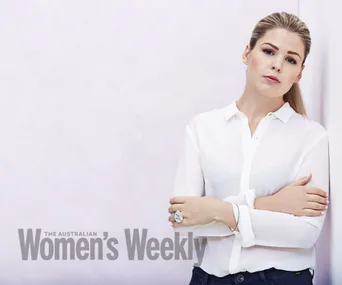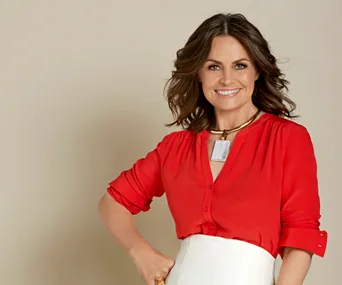She’s one of the most popular presenters on television – and when The Weekly asked her to share details of her complicated childhood, she obliged.
“If the Women’s Weekly put me on the cover and want to know my story I’m not going to embellish and rub out the bits that are a bit ugly,” she told interviewer Mia Freedman. “My story is a bit complicated and it’s not white picket fence.
“When (The Weekly) said: ‘We want to know your story’, I felt I had to tell the bits that were perhaps a bit unpalatable for some members of my family. It is what it is, I say it as it is, I’m not going to pretend it was something else.”
The interview, which appeared in the April 2012 edition of the magazine, revealed Georgie’s family life growing up was challenging. She said at the time she wanted to share details of her own life story to dispel the myth that troubled homes were the exclusive preserve of only certain sections of society.
“What I was also trying to get across with all of that is it’s not woe be me. I am so lucky. I’ve had an amazing journey and I am so privileged in every sense of the word so that was what I was also trying to get across.
“There are bumpy bits and there are ugly bits and there are some beautiful smooth bits,” she added. “Sadly I’ve got a brother who still isn’t talking to me, three years on.”
Read the full interview from the April 2012 issue of The Australian Women’s Weekly magazine here…
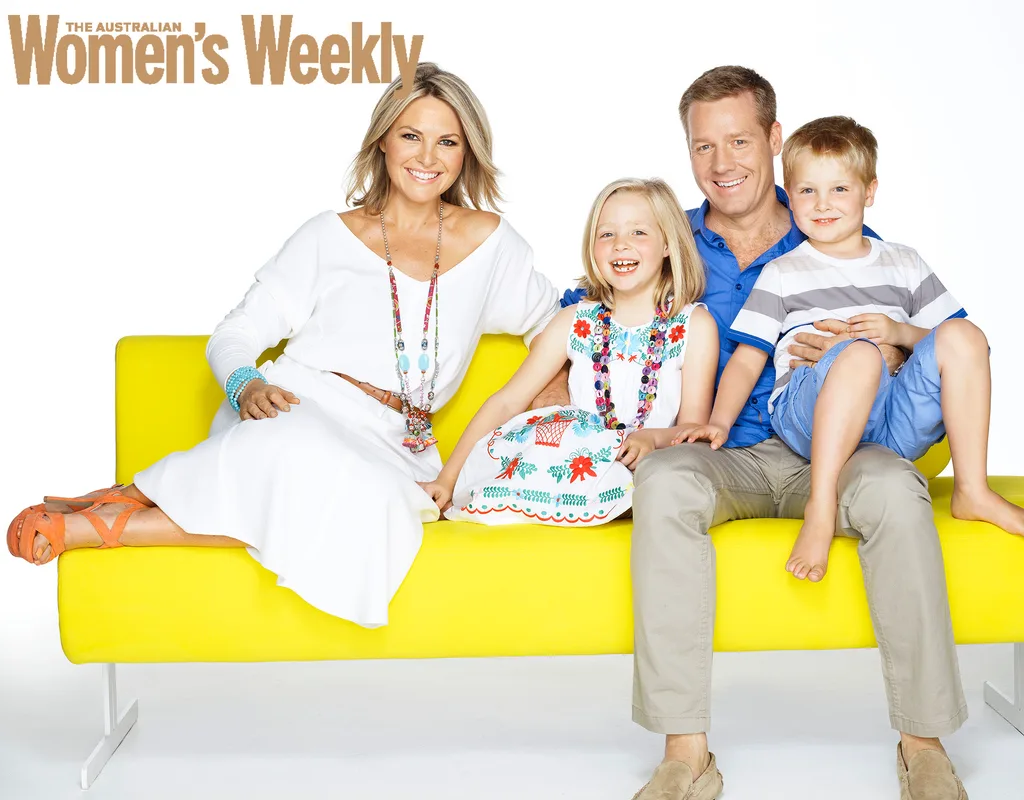
TV personality Georgie Gardener is happiest when spending time with her family, husband Tim and daughter Bronte and son Angus.
Watch Georgie Gardner on TV every morning and you can’t help but wonder if the expression ‘still waters run deep’ wasn’t invented for the express purpose of describing her. She sits on the set of the Today Show, imparting the day’s news with a seriousness and professionalism that is impressive. Perfectly coiffed, immaculately made-up, a pair of deep brown eyes that don’t suffer fools and a delivery whose tone is at once warm and authoritative – she is the unflappable face of the day’s unfolding events.
Yet there’s something about the flawlessly groomed façade that invites scrutiny. And when you start to scratch at the Georgie Gardner surface, you quickly get the sense that, while utterly professional and serious about her work, she could walk away from it all tomorrow: it’s not the number one priority in her life.
The media industry may well be a refuge for narcissists and navel gazers, but Georgie doesn’t appear to buy into any of it. Certainly when you speak to her, or to those who know her, you come to understand that while Georgie Gardner is ambitious and driven to be the best at what she does, she’s also sufficiently grounded by her own life experience – her own complicated past – to know what really matters.
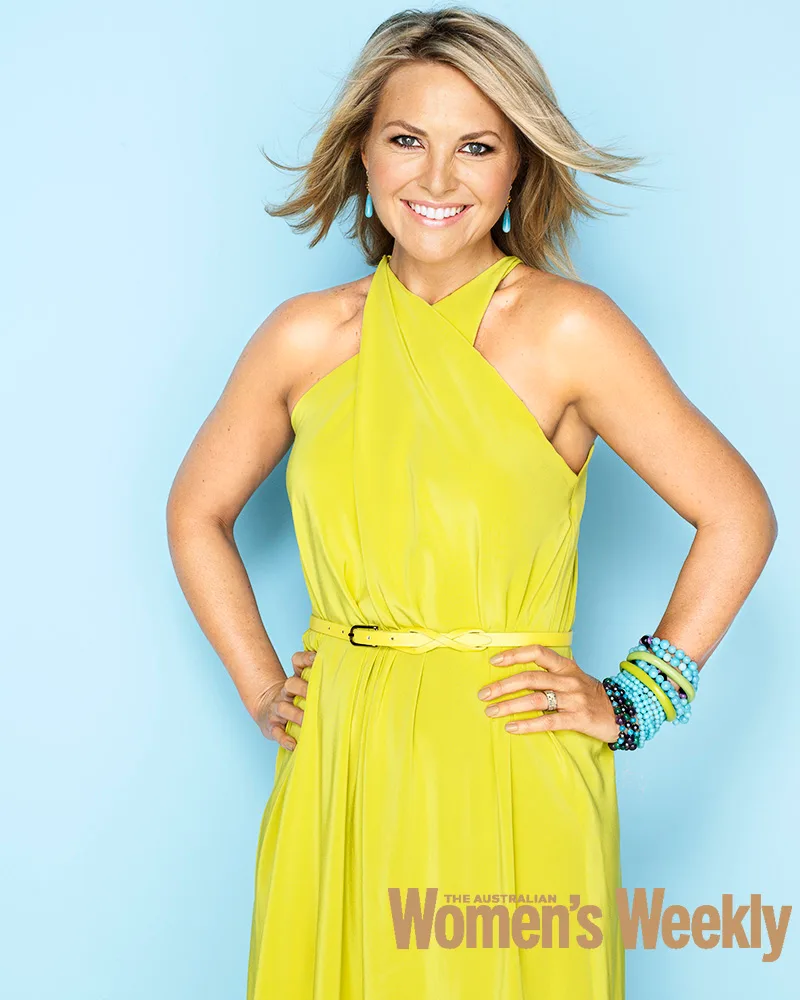
“I try and focus on the positives,” says Georgie.
Until recently, before her youngest child Angus, now 4, went to school, Georgie performed an early morning scramble. As the clock struck nine and the lights came down on the Today Show studio, she would file away her news scripts, scrape off her make-up, jump in the car and make a bee-line for home. Husband Tim would have already despatched their daughter, Bronte, 6, to school and Georgie would swoop in, send hubby off to his office and back-up the seven hours of work she had just executed on national telly with a whole day of full-time parenting. Nothing remarkable there – it’s a working-mum balancing act being played out every day by parents all over Australia.
With both kids now at school, her scramble is a little less manic, but Georgie’s commitment to being the best mum she can be hasn’t faltered a bit. For becoming a mother, then creating and nurturing a harmonious family unit, has been the broadcaster’s number one priority for as long as she can remember.
By her own admission, Georgie, 41, took a long time to find the love of her life. Back in their early 30s, when they were both single and their friends were marrying off one by one, Georgie and fellow TV journalist, Jessica Rowe spent many a night out on faux dates together, sharing candlelit dinners and lamenting the lack of eligible men in Sydney.
“Partly because of my experience of marriage growing up, I was determined to get it right the first time and not compromise when choosing a life partner,” Georgie explains now.
When finally Georgie met investment banker and fellow Perth native Tim Baker at a party in Sydney in 2002, the love stars aligned.
“When I met Tim, it just felt right. I just knew,” she says. “He’s just a really kind, generous guy. He’s quite shy but self-assured. Fiercely intelligent, and he always has my back.
“He takes a bit of interest in what I do for a living but on the whole could take it or leave it. He certainly isn’t mesmerised by it. When we first met, I had just started at Channel 9 and he didn’t know who Kerri-Anne Kennerley was. And I love that about him.
“He brings so much love and joy to my life. And he is a phenomenal father. I have said to the kids on so many occasions, you have the best father going around. And he puts up with me.”
On one of their first dates, Tim, 40 took his paramour on a five kilometre trek through rugged bushland north of Sydney.
“It was a tough walk,” Tim recalls. “Georgie neglected to mention she was scheduled to undergo surgery on her ankle the following week. The fact that she did it without complaining and that a bushwalk was equally as interesting to her as dinner at a flash restaurant was really appealing.”
So appealing in fact, that Tim only waited four months after meeting Georgie to ask her to be his wife. While on holiday together in Noosa, and at the end of another of his trademark gruelling bushwalks, the pair found themselves atop a headland, looking out to sea. He leaned in and whispered quietly into her ear: “Will you marry me?”
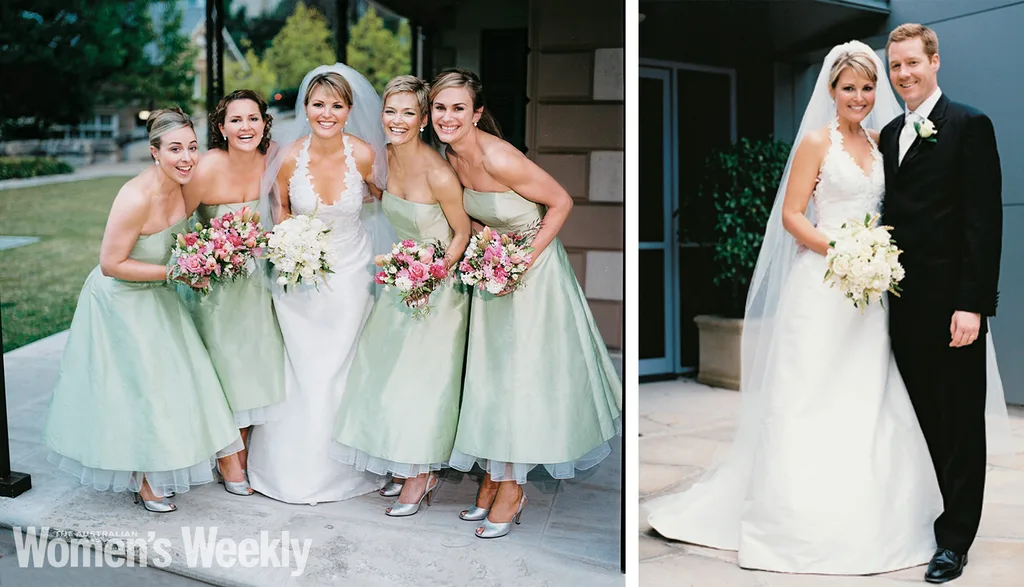
The happy bride flanked by her bridesmaids (from left) Georgie’s sisters, Katie Ireland and Elizabeth Kyle, and friends Jessica Rowe and Suzanne Julian. Right: Georgie and Tim on their wedding day.
If you have any knowledge of the inner-workings of television, you would know it is a universe in which all is not what it seems. Glossy sets disguise run-down studios, autocues can make omniscient beings of even the most pedestrian presenter and on-air camaraderie is occasionally affected to hide real-life disdain. Be it a breakfast news program or a fully-fledged serial drama, viewers rarely glimpse what truly lies beneath.
And so it was, in a way, for Georgie Gardner growing up. The middle child of three siblings born and bred in Perth, Georgie’s world was relatively stress-free from ages nought to five. But when her parents divorced and her mother remarried soon thereafter – eventually going on to bear two more children to her new husband – everything changed.
At the time of the divorce, and as a confused five-year-old, Georgie blamed herself for the rupture.
“I remember when I was in Year 1, my teacher saying to me: “Georgie Gardner, you walk around like you have the world on your shoulders,” she recalls. “And I remember thinking to myself: “If only you knew, that’s exactly how I feel.” I felt so responsible for my parents’ divorce. It was such a bitter split.”
Georgie’s new post-divorce life had all the trappings of domestic bliss. She lived in Dalkeith, one of Perth’s most affluent suburbs. She attended St Hilda’s, the Western Australian capital’s most exclusive private girl’s school. Her mother was a pillar of Perth society and her new stepfather was the son of the state’s governor and a respected lawyer. There were trips to Government House when the Queen was visiting, tea parties and pretty frocks. From the outside, theirs was a life of enviable privilege and respectability, but beyond the white picket fence and behind closed doors, life was infinitely more complicated.
“There was a tumultuous divorce when we were very young and it led to difficulties in the house we were growing up in with our mother and stepfather and it was not pleasant,” explains Georgie’s younger brother, John. “I don’t have particularly fond memories of childhood myself and I know Georgie doesn’t.
“What Georgie, (elder sister) Katie and I have in common, which is perhaps a result of that experience when we were young, is that we are all pretty resilient, determined and we have all worked hard to get to where we are in life.”
Suzanne Julian is one of Georgie’s oldest friends. They met at school when they were 12 years old.
Suzanne remembers Georgie as a “natural leader” with “the gift of the gab and a wicked sense of humour” who had lead roles in all the school musicals such that “everyone assumed she was going to leave school and become an actress.”
Suzanne also spent a lot of time at Georgie’s house, and saw first-hand the tensions with which Georgie and her siblings lived.
“I was very aware of what was playing out in her home life,” says Suzanne. “Everything was not as it seemed on the outside. There was a lot of pressure on Georgie as a young girl – there were things going on at home that were not pleasant. You can go to the best school and wear a nice uniform but if things are not right at home, you are no better off than anyone else.
“Georgie has definitely been affected by her family situation over the years, which I know has been a real struggle for her. It’s also why she is all the more amazing. I just look at her, and knowing all the crap she has been through, I think the way she has blossomed is such a credit to her. She could have let it get her down but instead of dwelling on it or complaining about it, she has carved out such an amazing, impressive life – and importantly, she’s managed to keep her integrity along the way.”
“Loyal” is a word used regularly by those interviewed for this story to describe Georgie. And it’s a trait those closest to her seem determined to display when it comes to talking about their
friend’s background. Each of them will talk in general terms about their Georgie’s difficult childhood, but none will go into specific.
“In spite of the childhood she’s had, she is the most giving, generous woman and the most divine mother who is so obviously determined to create the family environment she always yearned for but never really had,” offers Jessica Rowe. “Career is important to her, but it just pales. It’s not the main game. This beautiful family that she has forged, in spite of and because of what she’s experienced, that’s what truly matters to Georgie.
“Given the upbringing she had, it’s amazing she isn’t consumed with bitterness and rancour. But it’s testament to what a strong woman she is. She refuses to be broken by it, refuses to be a victim and refuses, ultimately, to be defined by her difficult past.”
When asked, Georgie herself won’t be drawn on exactly what the home life “unpleasantness” comprised, except to say she and her siblings suffered after their mother re-married.
“We had a privileged upbringing, in the material and opportunity sense, but there was a lot of turbulence and confusion and deep sadness brought on by a pretty bitter divorce,” she says. “During the darkest period my friends and siblings got me through.”
Though she won’t say it outright, it’s obvious Georgie experienced some sort of trauma growing up. She says she doesn’t want to talk about it publically – “it risks hurting too many people I care about” – yet it clearly gives shape to her every day: the way she leads her life, the weighting she ultimately gives to the personal over the professional and her zealous pursuit of a harmonious home life.
She has only limited contact with her mother now, and only then for the sake of not denying her children a relationship with their grandmother.
And yet she’s also acutely aware of the privileges she enjoyed and the opportunities afforded by her education and upbringing. She bristles visibly at any suggestion she is a victim.
“I never feel woe is me, because I have so much in my life now to be grateful for and I have managed to extricate myself from that toxic environment and surround myself with beautiful loving, incredible people,” Georgie says. “And I do have happy memories as well, particularly with my late father, so I haven’t let those dark times define me.”
Following his divorce from her mother, Georgie’s father remarried and started a new family. Despite him making what Georgie describes as heartfelt attempts to foster a relationship with the three children from his first marriage, lingering bitterness from the divorce largely prevented it.
Georgie’s father, a man she now describes as “a beautiful person, a really beautiful soul”, died when he was just 53. A successful operation to treat cancer of the oesophagus went tragically awry when he contracted a post-operative infection and died in hospital three weeks later. For Georgie and her siblings, the blow was unexpected and devastating.
“In many respects, she was just starting to get her life together after a complicated childhood and felt like she had had the rug pulled out from under her once again,” says husband Tim. “It was a cruel twist of fate.”
According to brother John: “Whether they would openly admit it or not, the girls had drifted from dad. Over the years, they felt they hadn’t had the support and nurturing they thought they needed from him. When he passed away, I think they both took it badly because they felt the loss of years even more so.”
Says Georgie of her Dad’s death: “I just feel sad he never got to meet Tim and he didn’t get to know our children. I felt like I lost him as a child during the divorce and then lost him again as a 25-year old.
“Suffice to say, divorce can be very destructive and a fair amount of pain and misunderstanding exists to this day. But I try and focus on the positives and without question my greatest achievement is creating the family unit I have now. They’re my world, I’m at my happiest when I’m with my family.”
It’s something Today Show colleague, Lisa Wilkinson sees first- hand every day.
“One of the things I really admire about Georgie is that she has made it clear that she is a wife and mum before anything else,” she says. “And she is so very good at her job that her bosses fit in around that.”
Georgie says there’s not a day goes by she doesn’t look at her two children and count her blessings. But that doesn’t mean she hasn’t yearned for a third.
“We’ve been trying to have a third but it just hasn’t happened,” she confides. “We’ve had two miscarriages and we have just drawn a bit of a line under it and accepted it probably isn’t going to happen.
“It did get me thinking however about how common it is and how many people are walking around carrying that sadness. Just because it’s not tangible to everyone else, it doesn’t mean it’s not painful and lonely and upsetting.”
She pauses before adding: “The little one we conceived and lost would have been due at the end of this month – so that’s a bit of a hurdle to get over.”
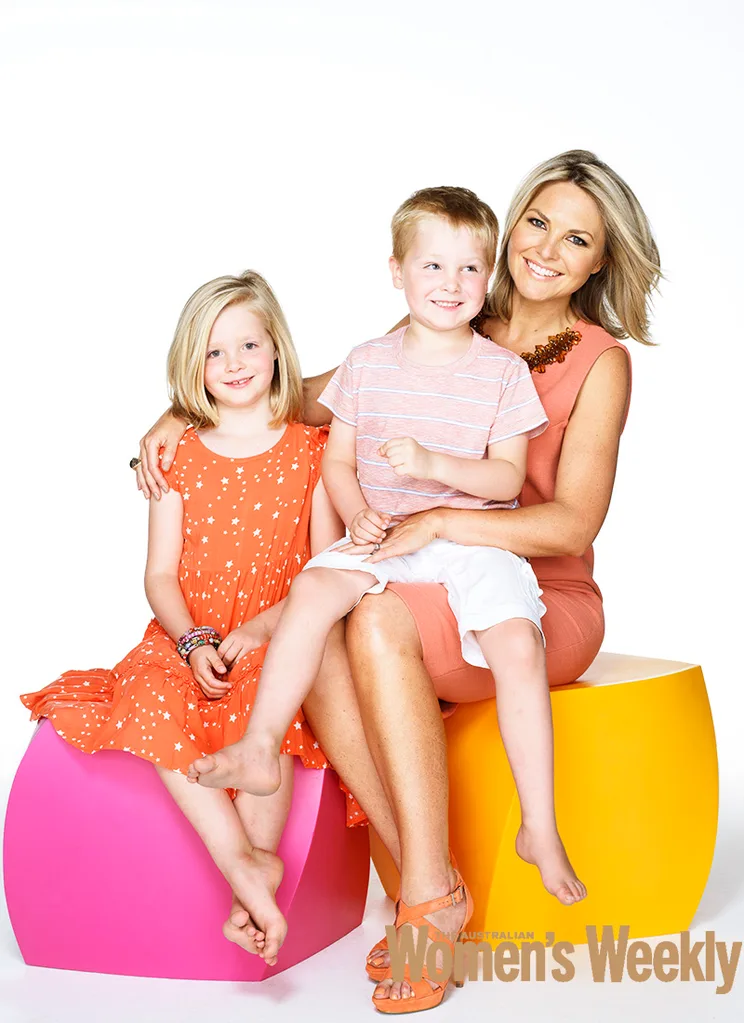
Goergie with her two children Bronte and Angus.
In a town square in Derby, on the far north coast of Western Australia, there’s a statue to a man called Robert Rowell. The cast-iron likeness of the one-time local cattle king celebrates the contribution made by the businessman in the 1940s to the establishment of Derby and the development of vast tracts of the neighbouring Kimberley landscape.
Known locally as the “King of Derby”, Robert’s frontier empire comprised cattle stations, a transport and earthmoving company, local stores, an outdoor cinema and a pearl lugger.
In its time, the R.M. Rowell & Company’s shipping operation was a vital trade link out of the Kimberley, transporting the region’s bounty to markets around the country and around the world. It was a lucrative business and one that made its owner – Georgie’s grandfather, the pioneering Mr Rowell – a very rich man.
It’s not too much of a stretch to say Georgie inherited something of her grandfather’s pioneering spirit (though not much of his wealth by all accounts). When, at the end of school she couldn’t decide what she wanted to do, and keen to get away from Perth, she jumped on a plane to Italy. She was 17-years-old and armed only with the address of a family in Milan she was Europe-bound to offer her services as a nanny.
“It was meant to be a 10-month trip but it turned into two years,” she says. “I just needed to get away from home. Italy was fabulous. I still have a real passion for all things Italian.”
Almost two years later she returned to Perth and enrolled in the media course at the Western Australian Academy of Performing Arts (WAAPA). She had planned to audition for the acting course – incubator of such local talent as Hugh Jackman and Lisa McCune – but found herself drawn to the journalism degree at the last minute.
“As I girl I used to run around the house with an old tape recorder, interviewing everyone in the family,” explains Georgie. “Within months of starting the course, I knew I had found my calling.”
Straight after university, she landed a job at 2NX radio station in Newcastle. She crossed the continent and cut her journalistic teeth chasing stories in the steel city before making the move south to the big smoke of Sydney to read the news on radio station 2DayFM.
Fellow WAAPA graduate and friend, Mark Gibson, himself a recent recruit to Channel Ten’s Sydney newsroom, convinced Georgie to give TV a try. Reluctantly she agreed. “I’d never had any real interest in TV,” she says now. “Radio was my passion.”
According to Mark, whether or not Georgie was interested in TV was largely academic. TV was very interested in her.
“Pretty much the minute she walked into the Channel Ten building they screen-tested her and wanted her behind the desk reading the news as soon as possible,” he says. “She was made for TV.”
It was in the Ten newsroom that she met fellow cub reporters Jessica Rowe and Suzanne Mostyn – the latter of whom fondly remembers long Sydney summers whooping it up at Georgie’s eastern suburbs share house.
“It was known as the Summer Palace,” says Suzanne. “Georgie used to throw great parties. She loves good music, good friends and a good laugh. And she has an excellent voice, honed during years of school musicals. She loves belting out a Shirley Bassey tune.”
From Ten, she was lured to Channel Seven where, as well as performing newsreading duties, she co-hosted the first iteration of the Sunrise program. When Nine came a-knocking with the offer to work alongside newsreading supremo Brian Henderson, Georgie jumped at it.
“Not long after she started, Georgie sent me tapes of her newsreading, asking me what she might improve,” recalls Brian. “I watched them, handed them back and told her there was nothing to be done. She was, to my mind, perfect.”
But apparently not all viewers agree with Hendo. Hardly a day goes by on the Today Show set when Georgie doesn’t receive an email about her appearance.
“TV is a visual medium and people don’t hesitate to voice their opinions about how you are looking,” she confides. “And when you receive an email at quarter to six in the morning titled “wrinkly witch” it does take the wind out of your sails momentarily.
“But in a way, comments like that make me even more determined to say: ‘Well, this is who I am, wrinkly witch, warts and all’. I have a daughter and I want her to learn that it’s what’s going on inside the heart and the head that really counts.”
She says she has no interest in cosmetic surgery and finds the increasing prevalence of botox disturbing.
“I would never tell other women what to do, it’s entirely up to the individual. But if someone came up to me and tapped me on the shoulder and said: “We think you should consider botox”, then that is absolutely the time for me to hang up my microphone.”
According to Tom Malone, executive producer of the Today Show, the success of the program rests in no small part on the ability of Georgie and co-host, Lisa Wilkinson to relate to female viewers. Ask Georgie to describe her job, however, and she defers quickly to self-deprecation.
“As I say to the children when they ask me what I do for a job: I read out loud.”
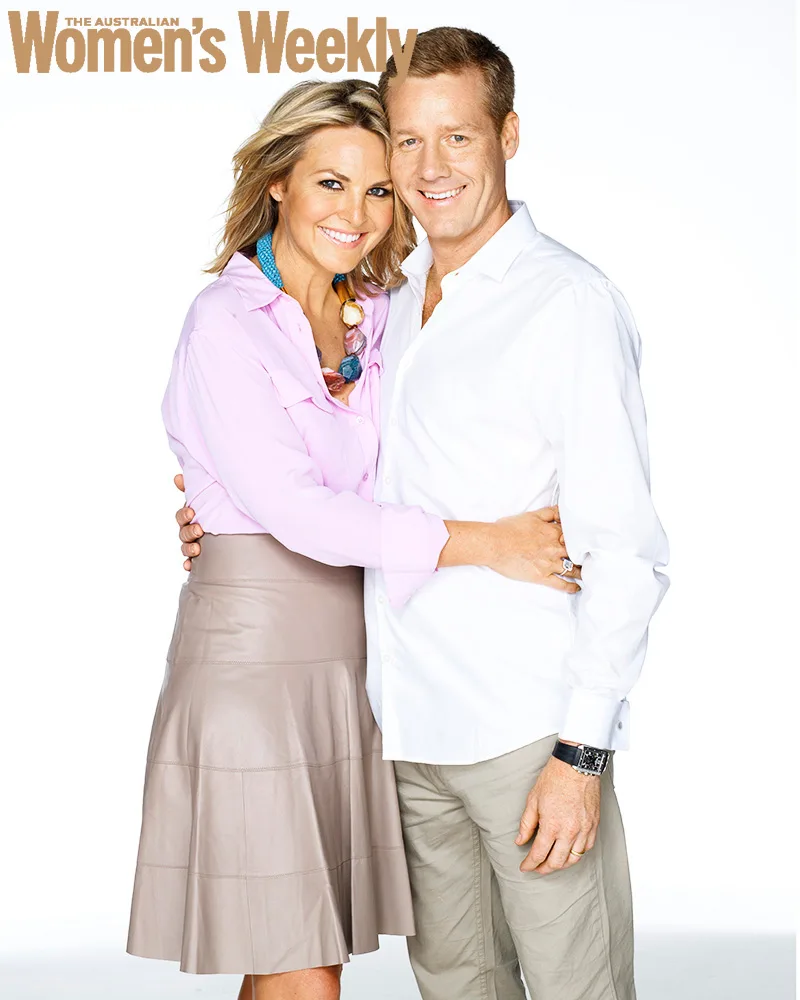
Following a whirlwind romance, Georgie and Tim were married just four months after they met. “When I met Tim, it just felt right.”
But the joking masks a seriousness about her work and a dedication to her craft that some who toil alongside her say borders on the obsessive. For perfection is somewhat of a daily pursuit for Georgie Gardner. In the newsroom, she’s famous for having scripts that are pitch-perfect: she personally oversees each one and corrects any mistakes in grammar or spelling. She’s her own harshest critic, reviewing each news bulletin after the fact and wondering what she could have improved. She can laugh with the best of them but she takes the responsibility of her job deadly seriously. She won’t take part in on-air banter for the sake of making noise and she doesn’t suffer fools. It’s all a part of her fundamental need to put order into chaos – be it the distillation of the day’s events for her TV audience, the running of a tight ship at home or the gradual coming to terms over time with a childhood that was less-than straightforward.
She enjoys an enviable career that she finds “incredibly fulfilling”, but otherwise puts all her effort into tending the little suburban bliss bubble she has created in Sydney – not by coincidence, as far away from her childhood hometown as the Australian continent allows her to be.
“One of the things I love most about Georgie is her strength of character,” says Tim at the end of our interview. “She is the sum of her experiences, but she won’t allow herself to be defined by them.”
Or as Jessica Rowe says of her friend: “She knows what matters and what endures. It’s love, it’s friendships and it’s family that are true.”
A version of this story originally appeared in the April 2012 issue of The Australian Women’s Weekly. All magazine images by Michelle Holden and styling by Judith Cook.

